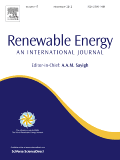
Renewable Energy
Scope & Guideline
Empowering a Sustainable Future.
Introduction
Aims and Scopes
- Renewable Energy Systems Integration:
Research on the integration of various renewable energy systems, such as solar, wind, and biomass, into existing infrastructures, including microgrids and smart grids. - Energy Storage Solutions:
Exploration of advanced energy storage technologies, including thermal energy storage, battery systems, and novel materials to enhance the efficiency and reliability of renewable energy sources. - Sustainability Assessments:
Evaluating the environmental, economic, and social impacts of renewable energy projects through life cycle assessments, techno-economic analyses, and sustainability frameworks. - Innovative Renewable Technologies:
Development and testing of novel renewable energy technologies, including advanced solar collectors, wind turbines, and bioenergy conversion systems. - Policy and Economic Dynamics:
Analysis of the regulatory, economic, and market dynamics influencing the adoption and implementation of renewable energy technologies at local, national, and global levels. - Climate Change Mitigation Strategies:
Research aimed at understanding the role of renewable energy in mitigating climate change impacts, including studies on carbon emissions reduction and energy transition pathways.
Trending and Emerging
- Hybrid Renewable Energy Systems:
Research on the integration of multiple renewable energy sources, such as wind, solar, and biomass, into hybrid systems that optimize energy production and enhance reliability. - Artificial Intelligence in Energy Management:
The application of AI and machine learning techniques for predictive modeling, optimization, and control of renewable energy systems is rapidly growing, reflecting the increasing importance of data-driven approaches. - Decarbonization Pathways:
Studies focusing on strategies and technologies for achieving net-zero emissions and carbon neutrality through the deployment of renewable energy systems. - Circular Economy in Energy Systems:
Emerging research on circular economy principles applied to renewable energy, including waste valorization, resource recovery, and sustainable lifecycle management. - Advanced Energy Storage Technologies:
Significant focus on innovative energy storage solutions, such as solid-state batteries, thermal energy storage, and hydrogen storage systems, to enhance the efficiency and reliability of renewable energy. - Socioeconomic Impacts of Energy Transition:
Research examining the social, economic, and environmental impacts of transitioning to renewable energy sources, including public acceptance and policy implications.
Declining or Waning
- Traditional Biomass Energy:
Research on conventional biomass energy sources, such as wood and crop residues, has seen a decrease as attention shifts towards more advanced and sustainable biomass conversion technologies. - Basic Solar Thermal Technologies:
The focus on traditional solar thermal systems is waning, with more emphasis now placed on innovative designs and hybrid systems that integrate solar thermal with other technologies. - Geothermal Energy Applications:
While geothermal energy remains important, the volume of new research papers focusing on conventional geothermal systems has declined, possibly due to saturation in the field and a shift towards hybrid and integrated systems. - Hydropower Optimization Techniques:
Research on traditional hydropower optimization techniques is decreasing as the focus shifts to innovative methods and technologies for harnessing kinetic and potential energy from water in more sustainable ways. - Energy Efficiency in Conventional Systems:
There is a noticeable reduction in studies focusing on energy efficiency improvements in conventional energy systems, as the journal increasingly emphasizes renewable and sustainable alternatives.
Similar Journals

Green Energy & Environment
Exploring the Frontiers of Green Energy and Ecological Sustainability.Green Energy & Environment, published by KEAI PUBLISHING LTD, stands as a pioneering journal dedicated to the dynamic fields of renewable energy, sustainability, and environmental science. With its ISSN 2096-2797 and E-ISSN 2468-0257, this Q1 journal holds a noteworthy presence in academic discourse, reflecting its high-quality contributions within these critical areas of research. Launched in 2016, it has consistently embraced an Open Access model, facilitating unhindered access to research findings and fostering collaboration across global communities. Based in Beijing, China, this journal is dedicated to disseminating innovative insights that are essential for addressing urgent global challenges related to energy and environmental sustainability. Researchers, professionals, and students alike benefit from a platform that not only showcases pioneering research but also encourages interdisciplinary dialogue and knowledge exchange in the pursuit of a sustainable future.

International Journal of Renewable Energy Research
Exploring the frontiers of renewable energy technology.International Journal of Renewable Energy Research (IJRER) is a distinguished peer-reviewed journal dedicated to advancing the field of renewable energy through innovative research and comprehensive analyses. Published by the esteemed INT JOURNAL RENEWABLE ENERGY RESEARCH, this journal has established itself as a vital resource for academics and industry professionals alike since its inception in 2011. With a focus on a wide array of topics in Energy Engineering and Power Technology and Renewable Energy, Sustainability and the Environment, IJRER has been recognized for its contributions, attaining a Q3 categorization in Energy Engineering and Power Technology and a Q4 rank in Renewable Energy for 2023. The journal is indexed in Scopus, demonstrating its global reach and impact, with notable rankings in both relevant categories. Researchers can access a wealth of valuable insights and findings that are crucial for fostering sustainable practices and technologies. Thus, IJRER plays a pivotal role in driving the future of renewable energy research and innovation.
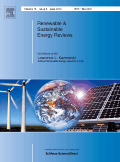
RENEWABLE & SUSTAINABLE ENERGY REVIEWS
Exploring Innovations in Renewable SustainabilityRENEWABLE & SUSTAINABLE ENERGY REVIEWS is a premier interdisciplinary journal published by Pergamon-Elsevier Science Ltd that focuses on cutting-edge research and reviews in the field of renewable energy and sustainability. With an esteemed impact factor, the journal stands out in Q1 category rankings for Renewable Energy, Sustainability, and the Environment, holding a remarkable rank of #7 out of 270 in Scopus with a 97th percentile rating. Since its inception in 1997, it has provided a vital platform for scholars and practitioners to disseminate knowledge, share innovative solutions, and discuss the technological advancements needed to foster a sustainable energy future. Although not currently offering open access, the journal ensures valuable insights are available to its audience, contributing enormously to the global discourse on renewable energy policy and practice. The journal is vital for anyone interested in the dynamics of sustainability in energy systems, as it bridges the gap between academia and practical application.

MRS Energy & Sustainability
Advancing Energy Solutions for a Sustainable FutureMRS Energy & Sustainability is a premier interdisciplinary journal published by SpringerNature, focusing on advancing the understanding of energy systems and sustainability within the context of materials science and engineering. Since its inception in 2014, this journal has rapidly gained recognition in the academic landscape, achieving impressive rankings including Q1 in Electronic, Optical and Magnetic Materials and Mechanics of Materials, and Q2 in Energy Engineering and Power Technology as well as Renewable Energy, Sustainability and the Environment, as of 2023. The journal's ISSN is 2329-2229 and E-ISSN is 2329-2237. With a commitment to open access, it provides researchers and professionals with the latest findings and insights essential for guiding innovations in energy solutions and sustainable practices. The journal's global reach and high-impact reputation make it an invaluable resource for scientists, engineers, and policymakers dedicated to addressing the contemporary challenges of energy and sustainability. With a diverse scope and high Scopus rankings, MRS Energy & Sustainability continues to be at the forefront of research that shapes our energy future.
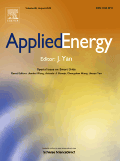
APPLIED ENERGY
Illuminating pathways to efficient energy practices.APPLIED ENERGY, published by Elsevier Science Ltd, is a leading journal dedicated to the advancing field of energy research, focusing on practical engineering solutions to contemporary challenges in energy management, sustainability, and environmental impact. With a rigorous peer-review process and a strong commitment to promoting innovative research, APPLIED ENERGY proudly holds multiple Q1 rankings across various categories, including Building and Construction, Civil and Structural Engineering, and Renewable Energy, reflecting its prestigious position within the academic community. Researchers and professionals can benefit from its comprehensive scope, covering topics that span from policy and technology to market dynamics. Although it is not an open-access journal, it provides access options that facilitate research dissemination. With its historical significance since 1975 and an ambitious outlook up to 2025, APPLIED ENERGY continues to be an essential resource for anyone looking to stay at the forefront of energy research and application.

Energy Storage
Pioneering Insights for a Sustainable Energy FutureEnergy Storage, published by WILEY, is a pivotal journal dedicated to the rapidly evolving field of energy storage technologies. Since its inception in 2019, the journal has established a significant platform for researchers and professionals by providing insightful articles that explore innovations and advancements in energy engineering and renewable energy systems. With an Impact Factor positioning it in the Q3 category for both Energy Engineering and Power Technology and Renewable Energy, Sustainability, and the Environment, Energy Storage plays a crucial role in disseminating knowledge that addresses global energy challenges. The journal is indexed in Scopus, showcasing its commitment to high-quality research, providing valuable contributions to the community including engaging studies and practical applications aimed at sustainable energy solutions. For those passionate about the future of energy, Energy Storage represents an essential resource for staying informed and connected within this dynamic and interdisciplinary field.
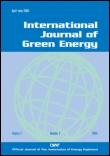
International Journal of Green Energy
Championing innovative research in the realm of sustainability.The International Journal of Green Energy is a premier publication that plays a pivotal role in the field of renewable energy and sustainability. Published by Taylor & Francis Inc, this journal, with ISSN 1543-5075 and E-ISSN 1543-5083, has established itself as a crucial platform for sharing innovative research and developments from 2005 to 2024. With a commendable Q2 ranking in the category of Renewable Energy, Sustainability and the Environment, it ranks 100 out of 270 in Scopus, positioning itself in the 63rd percentile of its field. The journal is dedicated to advancing knowledge and fostering dialogue around green technologies and sustainable practices, providing invaluable insights for researchers, industry professionals, and students alike. Although it does not offer open access options, the journal's commitment to rigorous peer review ensures that only high-quality research is published, making it an essential resource for those seeking to explore and understand the complexities of green energy solutions.

Smart Energy
Exploring Tomorrow's Energy Solutions TodaySmart Energy, an esteemed publication by ELSEVIER, stands at the forefront of energy research, exploring innovative solutions and sustainability practices in the energy sector. With an impressive Open Access model since its inception in 2021, this journal has rapidly established itself as a vital resource for researchers and professionals alike, providing unrestricted access to high-quality peer-reviewed articles. Positioned in the Q1 category across multiple fields, including Energy Engineering and Power Technology, Renewable Energy, and Management, Monitoring, Policy and Law, Smart Energy demonstrates a strong commitment to advancing knowledge in the energy domain. Registered under the ISSN 2666-9552, it garners significant attention, ranking within the top ranges of Scopus metrics across various disciplines. The journal continuously aims to bridge the gap between academic research and practical application, making it an essential outlet for scholars and practitioners dedicated to fostering sustainable energy solutions worldwide. Located in the United Kingdom, Smart Energy is shaping the future of energy management from its publishing base in Amsterdam, the Netherlands.

AIMS Energy
Advancing Innovations in Energy and SustainabilityAIMS Energy is a leading academic journal published by the American Institute of Mathematical Sciences (AIMS), dedicated to advancing the field of energy research. With a strong commitment to Open Access since its inception in 2013, this journal offers a platform for researchers, professionals, and students to share innovative findings and enrich the discourse in crucial areas such as Energy Engineering and Power Technology, Fuel Technology, and Renewable Energy, Sustainability and the Environment. Recognized for its quality, AIMS Energy holds a respectable impact with a Q3 ranking in multiple categories as of 2023, and it ranks within the top half of its peers in the Scopus database. The journal's objective is to disseminate high-quality research that addresses contemporary challenges in energy and offers sustainable solutions. By fostering collaboration and discussion among various stakeholders, AIMS Energy plays a critical role in shaping the future of energy technologies and policies.
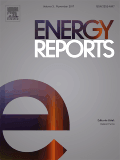
Energy Reports
Advancing Sustainable Energy Solutions for a Global AudienceEnergy Reports, published by Elsevier, is a prestigious open access journal that serves as a vital resource in the field of energy research. Since its inception in 2015, this journal has swiftly ascended to become a key player in disseminating knowledge across various energy-related disciplines, evident from its impressive Q2 ranking in the miscellaneous category of Energy for 2023 and its notable position in the 78th percentile among over 70 journals in the general energy category, ranked 16th out of 73 on Scopus. Based in the United Kingdom, Energy Reports not only fosters innovative research but also promotes accessibility by providing open access to its articles, thereby ensuring that findings reach a global audience of researchers, professionals, and students. With a commitment to advancing sustainable energy solutions and technologies, Energy Reports plays a crucial role in shaping future energy policies and practices, making it an essential platform for scholarly communication in the ever-evolving landscape of energy research.